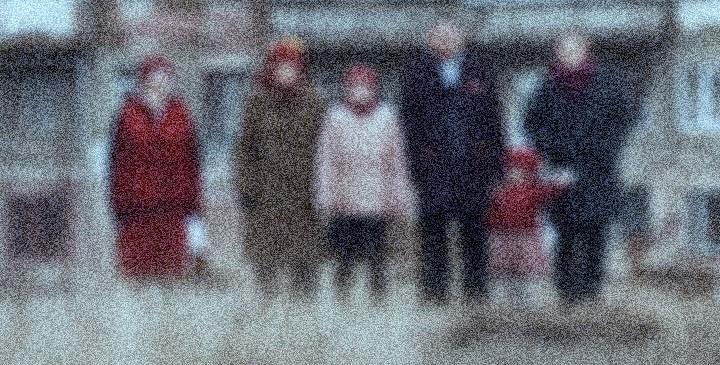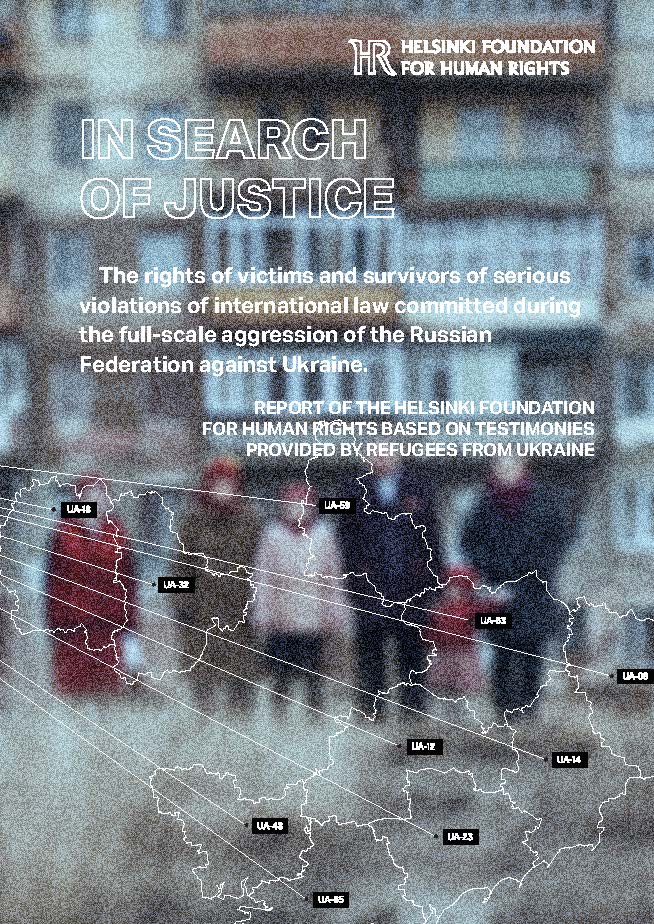The report of the Helsinki Foundation for Human Rights (HFHR)1 highlights the stories of refugees from Ukraine, who experienced serious violations of international humanitarian law (IHL) and gross violations of international human rights law (IHRL), such as torture, inhumane or degrading treatment; conflict-related sexual violence; or enforced disappearances. The document contains recommendations, primarily for the attention of the Polish authorities, proposing policy measures to increase the effectiveness of the investigations into the crimes committed in Ukraine; and offer urgent assistance (medical care, psycho-social services, and legal aid) for the individuals whose lives were adversely impacted by these crimes.
Since February 2022, the United Nations (UN), other international organizations, and civil society groups have documented serious violations of international law, committed primarily by the Russian Federation armed forces. HFHR joined these documentation efforts to support transitional justice mechanisms in Ukraine, such as criminal investigations against the perpetrators, truth-telling and comprehensive reparations,2 for the victims and survivors.
Between August 2022 and December 2023, HFHR teams spoke to 1800 individuals and conducted 105 in-depth interviews with people who witnessed or experienced violations of IHL and IHRL. The report contains an overview of these violations, specifically focusing on the population living in the territories occupied by the Russian Federation (where 70% of the refugees interviewed by HFHR came from).
The Russian Federation, as the aggressor in the war, whose armed forces are the perpetrators of most of the documented violations, is responsible for ending the atrocities and repairing the harm caused. In the absence of Russia’s willingness to do so, Ukraine, supported by other States, is stepping in to ensure the rights of the victims and survivors. HFHR urges the authorities in Poland to consider the following steps to further support these efforts:
-
Create a dedicated unit within the Office of the General Prosecutor to investigate crimes under international law.
Such a unit should work within the framework of a comprehensive strategy and receive the necessary resources to increase the technical capacity, specialized training and knowledge within the unit. Proper outreach and support measures for witnesses, victims and survivors (among the refugee population in Poland) willing to speak to the investigative mechanisms should be ensured.
-
Carry out an analysis of the current legal system, overseen by the Ministry of Justice, and consider the possibility of prosecuting cases related to crimes under international law before Polish courts.
Poland, as a country committed to the rule of law (and as a state bordering Ukraine and hosting a large number of refugees) is in a unique position to support access to justice for victims and survivors of crimes under international law. Considering the scale of the committed atrocities, universal jurisdiction exercised in countries such as Poland can help fight impunity.
-
Adopt necessary policies and regulations to ensure access to urgent assistance for the victims and survivors, who are refugees in Poland.
The authorities can implement Poland’s international commitments by ensuring that refugee victims and survivors of serious violations of international law are identified by the relevant authorities and institutions and provided with prompt access to appropriate services. Such support can help people overcome the detrimental impacts of the crimes that continue to affect their health and ability to work and function. Out of 1 million refugees, around 50% are employed and contribute with around 1% to Polish GDP.3 However, some people continue to face multiple vulnerabilities and require specialized assistance to access medical treatment related to the physical injuries they sustained, receive psychological assistance to address the trauma, and other types of legal and social support.
-
Create a multidisciplinary working group on access to justice and assistance for victims and survivors of serious violations of international law.
Such working group should be comprised of representatives of the relevant ministries, prosecutors, legal experts specializing in international criminal law, and NGOs to ensure regular collaboration and effective exchange of information.
The support of the international community is crucial to ensure accountability for the committed crimes. Continued financial and technical assistance must be provided to authorities in Ukraine, civil society actors, and international organizations to support transitional justice initiatives focused on access to justice and reparation, as well as urgent assistance for all victims and survivors of crimes under international law, including refugees.
The HFHR has been active in Ukraine since 2014. Initially, the activities carried out aimed to support Ukrainian organisations in documenting violations of international law in the context of the conflict in the eastern part of Ukraine and the Crimea occupied by the Russian Federation. Since 24 February 2022, HFHR has engaged in the process of documenting violations of IHL and ICCPR committed during the full-scale war in Ukraine. These violations can then, by the competent authorities, be assessed as international crimes. Since August 2022, Foundation teams have been contacting individuals willing to tell their stories and record their testimonies. HFPC's documentation activities are carried out in Poland in cooperation with the Ukraine.5 AM Coalition.


